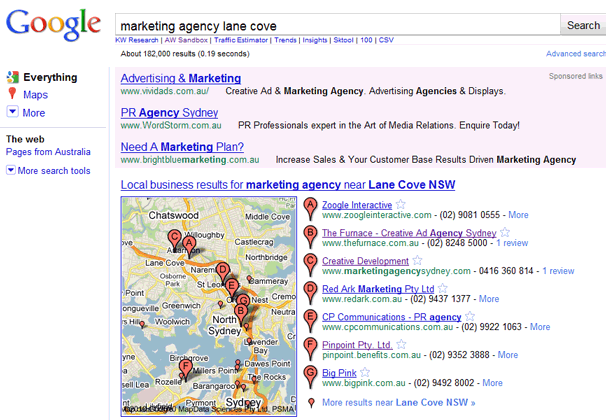Google Places is the new primary goal for SEO experts. As your website can sit, in most cases, at the top of Google, with a map, it is the most likely place people will click on when searching for businesses in their area. Google relies on a large amount information from a few different places. However, they claim the information that you submit to Google is the information that they trust the most.
If you are looking for information on Google Places, see what happens when you use the wrong description.
Anyone with a physical address can submit their business to Google Maps. However there are a few things they do to make sure the system is not being manipulated. To make sure the basic information you submit is accurate, Google will ask you to verify it first by entering a PIN that will be sent to either your business address or phone number.
There are a few things you can do to improve your chances of being listed high, or on the front page, of Google Maps. Before we get into the nitty gritty here are three quick things to remember about Google Places
- There is a far higher value placed on information from authoritative listings, such as Yellow Pages, White Pages and other directories. The closer the information in Google Maps to your Yellow Pages listing, the better.
- It relies on your physical location. There is more emphasis placed on the city/suburb of the search than the keywords
- The more you try old SEO tricks to manipulate the results, the worse off you will be.
- Google Places relies on proximity to the centre of the location to determine which results are called up. If your business address is in a large city, and you are far from the centre, you are going to struggle to improve your listing position.
The Easy Stuff
- One listing per physical location. Even you cover multiple towns, don’t use two listings. Instead, use the description of your business or categories to explain the different services your business offers. Businesses with special services, such as law firms and doctors or health centres, should not create multiple listings to cover all of their specialties.
- Use information as it would appear in the real world. People are going to be looking for you using your business card etc. You will also find your business listed by its real address in professional directories etc. You should try to be as official as possible.
- Do NOT try to “SEO” your business name and business listing. Represent your business exactly as it appears in the offline world. Again, this comes back to directories and professional bodies, (authoritative listings), listing your business name. Do not include phone numbers or URLs in the business name.
- Do not create listings at locations where the business does not physically exist. PO Boxes do not count as physical locations. The precise address for the business must be provided in place of broad city names or cross-streets.
- Provide a phone number that connects to your individual business location as directly as possible. For example, you should provide an individual location phone number in place of a call center. Provide one URL that best identifies your individual business location. Do not provide phone numbers or URLs that redirect or ‘refer’ users to other landing pages or phone numbers other than those of the actual business.
- Use the description and custom attribute fields to include additional information about your listing. This type of content should never appear in your business’s title, address or category fields.
The Harder Stuff
- Pick your Battles. If you have the chance to list your business in a small local area, do it. Do not try to go up against larger competitors in bigger areas.
- Try to get your address listed in as many places as possible. Add your physical location to every time you list in a local directory.
- Local citations are king. You should try to get your business and address listed in as many local addresses as possible.
- Good reviews through Google Places will improve your position. You should encourage your customers to write a review of you as much as possible.

One of the most critical elements of Google Places and the other local search engines and directories is Reviews. Google Places scrapes reviews from Yelp, InsiderPages, CitySearch, LetsDineOut, and TripAdvisor. Then it combines all reviews and uses the total number of reviews as a part of the ranking system.
A new tool was announced today that helps SMB’s get those critical reviews. We would love to know what your readers think about ShoutDog.com.
I believe the first 3 results in google places are the ones closet to the city hall. The next are made up of a combination of adwords and seo. So if you can try to get a PO Box near the city hall. Then you can always be listed first.
My customers love it when I get them listed high in google places search results. It is an easy way to get your business to the top of google. It usually shows up in a search that uses in. (pizza in new york)
It seems that people are more trusting of the google places results because they immediately know that the business is in the location they are looking for.
Ditto, my clients also love it when that happens. Getting high rankings at Google Places is an effective way to advertise small businesses within the locality of a, say prospective customer.